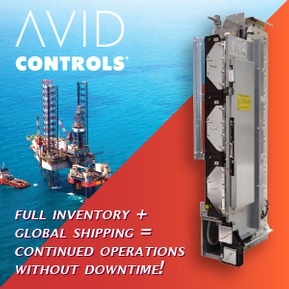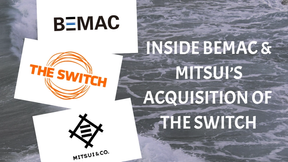BIO-UV Group Answers the Call for Compact BWTS with 'Smallest' UV BWTS Yet
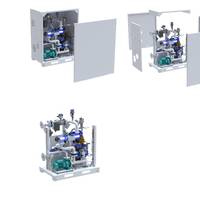
UV-based water treatment specialist BIO-UV Group has introduced what it says is arguably the smallest UV BWTS in the marketplace, targeted at meeting increased demand for ballast water treatment systems from operators of workboats, yachts, research ships, OSVs, and similar-sized vessels. The new BIO-SEA L01-0030 Mini – more compact than the company’s existing low-flow BIO-SEA L range – is a fully automated filtration + UV-based system designed to treat ballast water flow rates…
IMO to Review GHG Strategy and More at MEPC 80
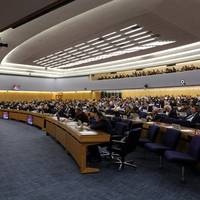
The IMO’s Marine Environment Protection Committee (MEPC) - 80th session will meet at IMO Headquarters in London from July 3-7, and amongst key agenda items, the MEPC 80 session is expected to adopt an upgraded IMO greenhouse gas strategy.The revised IMO GHG Strategy will contain concrete greenhouse gas reduction targets for the sector and is expected to outline a range of technical and economic measures. Negotiations have been ongoing and will continue during the Intersessional Working Group on Reduction of GHG Emissions from Ships (ISWG-GHG 15)…
RWO's BWMS Earns USCG Type Approval
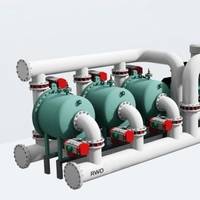
The U.S. Coast Guard (USCG) said its Marine Safety Center issued type approval to RWO GmbH for its ballast water management system (BWMS) after a detailed review of the manufacturer’s application determined the system met the requirements of 46 CFR 162.060.The treatment principle of the CleanBallast-Ocean Barrier System (CB-OBS) BWMS consists of filtration and electrochemical disinfection during ballasting and neutralization of residual active substances during deballasting. This approval covers seven models with maximum treatment rated capacities between 500 m3/h and 3…
BWM Convention Modification Enter into Force
The amendments to an international treaty aimed at preventing the spread of potentially invasive species in ships’ ballast water came into force yesterday (October 13), the International Maritime Organization (IMO) said.Ships regularly take on sea water, in tanks, to ensure their stability. Known as ballast water, this can contain many aquatic species, including in microscopic or larval form. These can become invasive and harmful if the ballast water is released, unmanaged, in a new location at the end of an ocean voyage.The International Convention for the Control and Management of Ships' Ballast Water and Sediments, 2004 (the BWM Convention) was adopted by IMO, a specialized agency of the United Nations, to address this problem.The BWM Convention entered into force in 2017.
Addressing Invasive Species in Ships’ Ballast Water
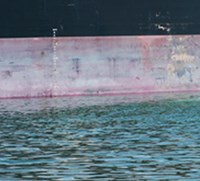
The BWM Convention amendments formalizing the implementation schedule for the D-2 standard are now in force. Amendments to an international treaty aimed at preventing the spread of potentially invasive species in ships' ballast water entered into force on October 13, 2019.Ships regularly take on sea water, in tanks, to ensure their stability. Known as ballast water, this can contain many aquatic species, including in microscopic or larval form. These can become invasive and harmful if the ballast water is released…
Fumigation Doesn't Work for Some Ship Cargoes
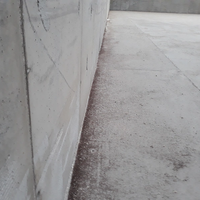
The fumigation of grain cargoes using certain pesticides, namely plant protection products, may not be effective in controlling insect larvae, resulting in cargo damage or loss.Javier Quintero Saavedra, head of HSE at Terminales Marítimos de Galicia (TMGA), an operator of bulk terminals in Galicia, Spain, and Chairman, Dry Bulk Cargoes Working Group, ICHCA, said: “We are finding that the pupae and larvae inside maize kernels in various consignments, and which were subjected to in-transit fumigation…
Bio-Sea BWTS Installed in CMA CGM Antoine De Saint Exupéry.
France's BIO-UV Group has successfully installed and commissioned its Bio-Sea ballast water treatment system (BWTS) in CMA CGM's new flagship, the 400 m long, 20,600 TEU CMA CGM Antoine De Saint Exupéry.The vessel, one of the largest containerships to be built by Hanjin Heavy Industries' yard in the Philippines, and the largest to fly the French flag, was christened in Le Havre earlier this month by the Minister of Economy and Finance, Bruno Le Maire, and the Minister in charge of Transport, Elisabeth Borne.BIO-UV Group will also supply BIO-Sea Units to nine 22,000TEU CMA CGM vessels under construction in China, following the signing of a supply order earlier this year.Benoit Gillmann…
Natural Ballast Set to Launch at SMM
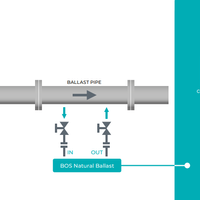
The new system BOS Natural Ballast set to launch at the SMM trade fair in Hamburg has been engineered to ensure that ballast water discharge standards are met at all times during the uptake and discharge. Generally, most ballast water systems involve methods of filtering off bacteria and pathogen cells larger than 50 microns in the first stage, and then follow by the processes of actively killing the remaining bacteria and pathogens with treatment options such as UV light, electrochlorination…
MOL Rolls Out Total Residual Oxidants Instrument
Mitsui O.S.K. Lines (MOL) announced commercialization of the Total Residual Oxidants (TRO) instrument "S.sensing WS," one of the major components of the Ballast Water Management System (BWMS). TRO is developed by Kurita Water Industries with the cooperation of MOL's group company MOL Engineering Co. In addition, MOL Techno-Trade will handle sales activities for the new product. BWMS are categorized as "UV type," "electrolysis type," "chemical type," and "ozone type." All except for the UV type sterilize harmful organisms in ballast water with various active substances. Therefore, accurately measuring the density of those active substances significantly impacts the effectiveness and treatment costs.
Boris Johnson Visits Coldharbour Marine

U.K. Foreign Secretary Boris Johnson paid a visit to Coldharbour Marine recently as the ballast water treatment system manufacturer’s facility in Nottinghamshire gears up for significant export-oriented production. Coldharbour Marine has spent more than 10 years researching and developing the system based on unique patented in-tank inert gas technology, which the manufacturer said is now undergoing rapid commercialization. Boris Johnson’s timing was no coincidence. The International Maritime Organization’s (IMO) Ballast Water Convention finally enters force on September 8 this year…
Disposal of Mining Wastes at Sea – New Expert Group
New work to assess the environmental impacts of wastes from mining operations which have been disposed into the marine environment is set to begin shortly. The work will be undertaken by a dedicated working group, established by the Joint Group of Experts on the Scientific Aspects of Marine Environmental Protection (GESAMP). GESAMP, which is a UN advisory body, set up the working group when it met for its 43rd annual session, in Nairobi, Kenya (14-18 November). The move to assess the impacts of mining wastes at sea comes in response to a request from the Parties to the London Convention and Protocol, which regulate the dumping of wastes at sea. GESAMP’s annual meeting was attended by scientists and representatives of GESAMP’s UN sponsoring organizations.
Ballast Water Convention to Enter into Force in 2017
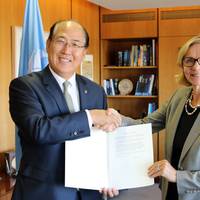
Finland has acceded to the International Convention for the Control and Management of Ships' Ballast Water and Sediments (BWM Convention), triggering the 2017 entry into force of an international environmental protection measure that aims to stop the spread of potentially invasive aquatic species in ships’ ballast water, the International Maritime Organization (IMO) said. Päivi Luostarinen, Ambassador Extraordinary and Plenipotentiary, Permanent Representative of Finland to IMO…
I-Tech Seals Market Acceptance for Selektope
Final sign-off of the antifouling active substance Selektope by the European Commission coincides the first disclosure of a commercial application in Asia. The first publicly-disclosed commercial application for a marine coating featuring Selektope will start on November 1 in Singapore, swiftly after developer I-Tech secured European Commission sign-off that the revolutionary antifouling substance can also be used by yards anywhere in Europe. Formal EC adoption of the approval regulation has been signed by EC President Jean-Claude Juncker, meaning that Selektope is permitted for use under the EU Biocidal Products Directive in professional and non-professional antifouling products throughout the EU from January 1, 2016.
IMO’s MEPC Set to Adopt Polar Code Provisions
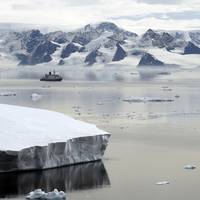
The Marine Environment Protection Committee (MEPC) of the International Maritime Organization (IMO) meets for its 68th session from May 11-15, 2015, at IMO Headquarters in London. Items on the agenda include the proposed adoption of the environmental part of the Polar Code and associated draft MARPOL amendments to make the Code mandatory; the implementation of the Ballast Water Management Convention; further work on air pollution and energy efficiency measures; and a proposal to extend the Great Barrier Reef and Torres Strait Particularly Sensitive Sea Area (PSSA) to parts of the Coral Sea.
VOS BWTS to Be Tested on APL Containership
Shipboard testing to be conducted on the vessel APL England as NEI takes the next step towards full USCG Type Approval for its Venturi Oxygen Stripping (VOS) Ballast Water Treatment System. NEI Treatment Systems announced that the container vessel APL England will be used for the shipboard testing phase of their VOS Ballast Water Treatment System (BWTS), to begin in the early summer of 2015. The APL England is a 67.9K DWT container vessel, trading between China and multiple ports on the U.S. West Coast. The vessel utilizes a VOS system operating at 1,250 m3/hr., and was installed seven years ago. The retrofit project was completed as an in-service “riding” installation.
IMO’s MEPC Addresses BWM Convention Issues
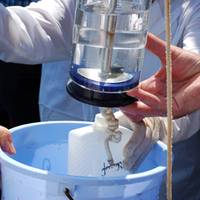
Measures to assist in accelerating the entry into force and implementation of the key international convention designed to eradicate the global spread of harmful organisms in ships’ ballast water were adopted by the Marine Environment Protection Committee (MEPC), of the International Maritime Organization (IMO), when it met for its 67th session (October 13-17, 2014). The International Convention for the Control and Management of Ships' Ballast Water and Sediments, 2004 (the BWM Convention)…
IMO’s MEPC Meets for 66h Session
The Marine Environment Protection Committee (MEPC) of the International Maritime Organization (IMO) meets for its 66th session from 31 March to 4 April 2014, at IMO Headquarters in London. Items on the agenda include the consideration of proposed amendments to the MARPOL to make the audit scheme mandatory; the review of environmental provisions in the draft Polar Code and associated draft amendments to make the Code mandatory, and the implementation of energy-efficiency regulations and the Ballast Water Management and Ship Recycling Conventions. The MEPC will consider, with a view to adoption, draft amendments to MARPOL Annexes I through to VI to make the use of the IMO Instruments Implementation Code (III Code) mandatory.
IMO MEPC Implements Further Energy Efficiency
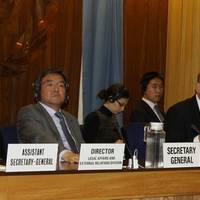
The Marine Environment Protection Committee (MEPC) of the International Maritime Organization (IMO) met for its 65th session from May 13-17 2013, at IMO Headquarters in London. The committee made significant progress in its work on further developing energy-efficiency regulations; adopted an MEPC resolution on rromotion of technical cooperation and transfer of technology relating to the improvement of energy efficiency of ships; and gave the go-ahead to carry out an update to the greenhouse gas (GHG) emissions’ estimate for international shipping.
Ship Energy, BWMS, Recycling on MEPC Agenda
The IMO's Marine Environment Protection Committee (MEPC) meets for its 65th session from 13 to 17 May 2013, at IMO HQ in London. Items on a busy agenda include the implementation of energy-efficiency regulations and the ballast water management and ship-recycling treaties. The MEPC is expected to continue its work on further developing technical and operational measures relating to energy-efficiency measures for ships, following the entry into force, on January 2013, of the new chapter 4 of MARPOL Annex VI, which includes requirements mandating the Energy Efficiency Design Index (EEDI), for new ships, and the Ship Energy Efficiency Management Plan (SEEMP), for all ships.
Ballast Water Tech: N.E.I.

As ship owners globally face the eventual mandate to install ballast water management technology onboard their ships – a refit which is touted as the most expensive equipment refit ever – Maritime Reporter & Engineering News in its February 2013 edition examines emerging Ballast Water Technologies for consideration. In 2002 N.E.I. began development of a de-oxygenation ballast water treatment system – the Venturi Oxygen Stripping (VOS). In 2007, N.E.I. obtained the world’s first IMO Certification-Liberia.
New Fuels, New Rules & New Tools

Helping the Maritime Community adapt to strict emission regulations. What has changed during 2012 in the maritime world and how has it impacted industry? It is recent IMO Marine Environment Protection Committee (MEPC), changes. IMO has adopted amendments to the International Convention for the Prevention of Pollution from Ships (MARPOL). These changes will have a vast and fundamental impact on the maritime industry and the world over the next few years. With new IMO regulations pertaining to emission control areas…
Conference Tackles Impact of Shipping on the Environment
Szczecin, Poland - The challenges of preparing to meet the next generation of shipping regulations were very much on the minds of the participants at Germanischer Lloyd's (GL) latest exchange forum in Szczecin, Poland. Reducing the impact of global shipping on the environment and making improvements in efficiency are the focus of looming legislation which, over the next few years, seems certain to change the maritime landscape. More than 40 representatives from the maritime industry, shipping companies, ship management agencies, maritime journalists and stakeholders met to hear presentations from GL experts and discuss how the incoming regulations would impact upon the industry.
Are the Ballast Water Stars Finally Aligning?
Ballast water was first recognized by the scientific community as a vector for transfer of potentially invasive marine species more than 30 years ago. It took a number of years, and acceptance that zebra mussels had reached the Great Lakes in the ballast water of ships arriving from the Black Sea, before the maritime industry generally acknowledged that they were part of the problem. Initially, high seas ballast water exchange was the only available means for removing potentially invasive species from the tanks. That methodology presented risks to the stability of the ship (and the safety of the crew), as illustrated by the near-loss of the car carrier Cougar Ace in 2006 in waters of the North Pacific Ocean just south of the Aleutian Chain.


